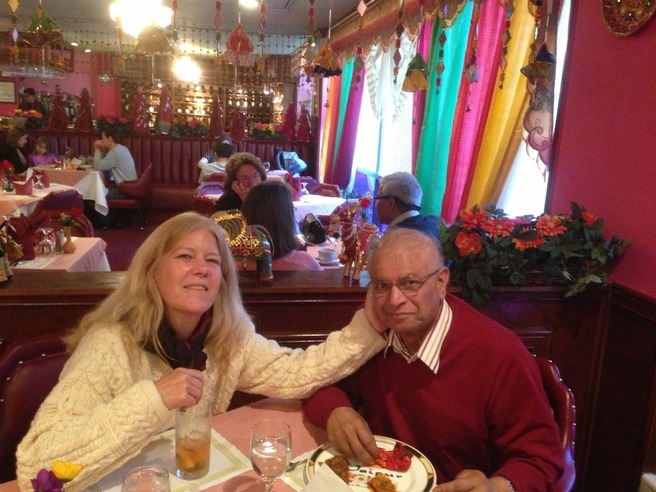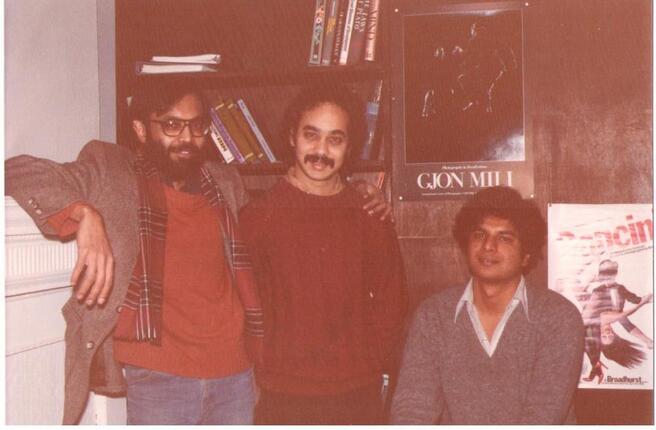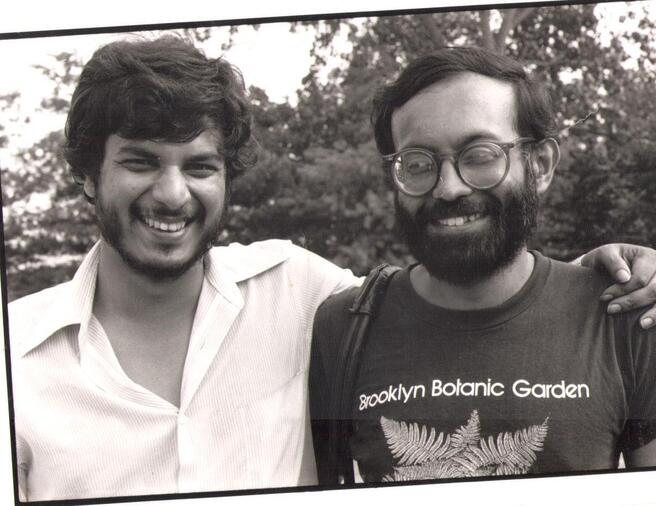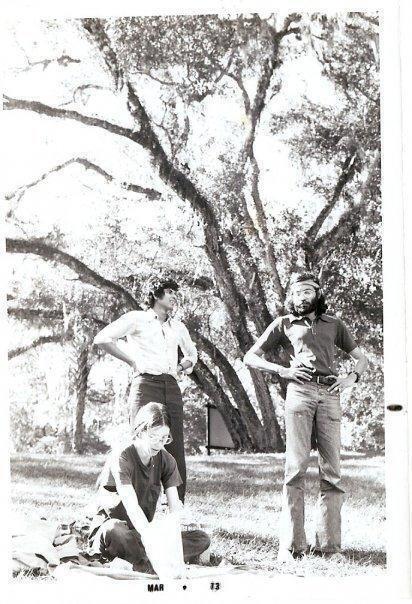Thanks to Biswajit Banerjee for archiving this treasure trove. Adhip sent these out via an e-mail routing list soon after he was diagnosed with lung cancer. This is a sampling. Bishu will post the rest soon.
_______
1On Sun, Sep 26, 2010 at 12:40 PM, <chaudhua@georgetown.edu> wrote:
I always wanted to be a Bengal Lancer
And ne'er an effete Tagore dancer.
I am not in fright
But spoiling for a fight
With this goddamn lung cancer.
Adhip Chaudhuri
10/8/10
Now that I have reached the half-way point
Of my chemo and radiation treatment,
I believe that Virginia Hospital is the joint
That might spare us from any bereavement
Oct 11, 2010
This morning Joanne and I got on Highway 66
To go and get my fourteenth radiation fix.
From the time we reach the hospital
It takes about thirty minutes total.
October 13, 2010
I forgot to announce that the last two poems were no longer limericks but part of a Sonnet. I have moved on to Sonnets because I was very impressed and inspired by Vikram Seth's "Golden Gate" which was written in that form of verse. Vikram Seth showed me how the verse form of Shakespeare and Milton could be effectively used to tell a great California story.
A Sonnet, as you already know , consists of fourteen lines. The first quatrain rhymes a-b-a-b ( "treatment" with "bereavement"), the second a-a-b-b ('Highway 66" with "fix"). The third quatrain rhymes a-b-b-a, and then there is the couplet:-
Nowadays it hurts a lot when I try to swallow.
It happens often when I eat solids,
But sometimes also while drinking liquids.
There does not seem to be a pattern to follow.
But I have been given three medicines to select
The one that will push back this nasty side effect.
Adhip Chaudhuri(Oct 13)
October 15, 2010
Another week of treatment has come to an end
Oh Mama, am I really on the mend?
Thirty-three miners are free in the Atacama,
But will I be free of Squamous Carsinoma?
Adhip Chaudhuri (Oct. 15)
October 16, 2010
Today was the service for my former colleague Bill.
He had fought lung cancer with radiation and chemo
And won, seeming like a cancer beater's model, a demo.
I had heard all this, but not called him still,
Then, even though he had dealt cancer a deflection
On Tuesday he died from a pneumonia infection.
Adhip Chaudhuri (Oct. 16)
October 19, 2010
Today my Gran reading was 2.1,
And hence the Chemo got done.
As did Radiation number 20,
Which now feels like plenty.
Adhip Chaudhuri (Oct 19)
October 21, 2010
The oesophagus hurts badly
Every time I try to drink or eat,
All the medicines I have, sadly,
Cannot this side-effect beat.
Adhip Chaudhuri (Oct 21)
October 24, 2010
During this weekend recess,
I am sipping liquids through a straw
Downing solids after a thorough gnaw;
It is all a learning process.
With adaptation I hope to gain
On this stubborn oesophagus pain.
Adhip Chaudhuri (Oct 24)
October 26, 2010
I got my sixth chemo today,
Also the twenty-fifth radiation.
The last session is on Friday,
Cause for a mini celebration?
Adhip Chaudhuri (Oct 26)
November 7, 2010
Yes, yes, folks I am still very much alive
Went to see the chemo doc on Nov 5.
He said that the radiation doc did not reach
When he said that I could in Spring teach.
Adhip Chaudhuri (Nov 7, 2010)
November 28, 2010
Tomorrow I start the high dose radiation (Cyberknife) treatment. They will attack the mid-chest area and try to kill the remaining cancer cells around the trachia and the oesophagus. There will be five consecutive sessions, each lasting one to one-and-a half hour.
Meanwhile, my prayer is:
O Cyberknife! O Cyberknife!
Please, please save my life.
As I would if I wert the Cyberknife
And thou wert a man with cancer rife.
Adhip Chaudhuri (Nov 28th, 2010)
December 4, 2010
Hi folks,
The five sessions of Cyberknife ended on Friday. This was the radiation aimed at the all important mid-chest area. Each session involved about forty-five minutes of radiation by a machine which reminded me of the multi-headed monsters of the "Alien" movies. Even though the radiation itself took forty-five minutes, the total time I had to lie still varied from an hour to an hour-and-half. One day I had an itch on my right cheek with almost half-hour to go! On Friday, the last day, I turned on my MP3 player to a folder titled "16 hits of Bob Dylan" but soon found out that there was only one song in it : "It Ain't Me Babe" by Johnny Cash. I had to hear the song fourteen consecutive times!
The sessions have been leaving me very tired and fatigued, but no other after-effects. The next round of Cyberknife sessions will be well into January.
Here's my poem of hope:
These cancer cells which dwell in my mid-chest,
Only know how to multiply and multiply
But do not like regular cells naturally die.
Hopefully they have mostly been fried and put to rest.
And the remaining ones which are still strong
Chemo will make sure they will not be so for long.
Adhip Chaudhuri (Dec 4, 2010)
January 11, 2011
Hello all,
Still recovering from the after-effects of the last Chemo on Jan 5th.
This is from "Emperor of All Maladies" and some research of my own:
The Persian Queen Atossa was the daughter of Cyrus the Great. In 522 B.C. Queen Atossa married Darius I, and they both ruled over the apex of the Persian Empire which included Babylon, Egypt, Mesopotamia, Baluchistan and Scythia (southern Russia). According to the Greek historian Herodatus, Queen Atossa led a very public life till she got a lump in her breast and thereafter disappeared from Darius's court "out of shame". Most, including Sid Mukherjee, believe that Queen Atossa contracted breast cancer.
The rest is from the Greek playwright Aeschylus, "The Persians" (472 B.C). One of the leading Greek physicians of that time , Democedes, had been enslaved by the Persians. Democedes offered to cure Atossa only if she would make sure that Persian expansion would be aimed toward Greece rather than east. Democedes, indeed, cured Queen Atossa by "excising" the tumor, and Darius I launched the Greek-Persian Wars which lasted for another one-hundred and fifty years.
The military might of King Darius
Was sent to Marathon and Thrace
Due to Queen Atossa's charm and grace.
Thus, were saved the kingdoms of the Indus.
Adhip Chaudhuri (Jan 11, 2011)
January 19, 2011
Here's a poem by W.H.Auden about a woman being diagnosed with cancer, a poem I found to be very poignant. Just as the doctor says in the poem, "Why didn't you come before?" is exactly what the doctor asked me when my cancer was confirmed.
Extracted from "Miss Gee" (1937)by W.H. Auden. I got the reference from Susan Sontag:"Illness as Metaphor".
Summer made the trees a picture,
Winter made them a wreck;
She bicycled to the evening service
With her clothes buttoned up to her neck.
She passed by the loving couples,
She turned her head away;
She passed by the loving couples
And they didn’t ask her to stay.
Miss Gee knelt down in the side-aisle,
She knelt down on her knees;
‘Lead me not into temptation
But make me a good girl, please.’
The days and nights went by her
Like waves round a Cornish wreck;
She bicycled down to the doctor
With her clothes buttoned up to her neck.
She bicycled down to the doctor,
And rang the surgery bell;
‘O, doctor, I’ve a pain inside me,
And I don’t feel very well.’
Doctor Thomas looked her over,
And then he looked some more;
Walked over to his wash-basin,
Said: ‘Why didn’t you come before?’
Doctor Thomas sat over his dinner,
Though his wife was waiting to ring,
Rolling his bread into pellets;
Said, ‘Cancer’s a funny thing.
‘Nobody knows what the cause is,
Though some pretend they do;
It’s like some hidden assassin
Waiting to strike at you.
Adhip Chaudhuri (Jan 19, 2010)
February 11, 2011
Now I am done with Cyberknife.
I tell you it was quite a strife.
But there can be great exultation
Like the Egyptian Revolution,
If it leaves no cancer cell with life.
Adhip Chaudhuri (Feb 11th, 2011)
August 21, 2011
We need a hazaar Hazares
I kind of like the new leader Anna.
He seems to have some amount of dharma.
We should stop being so daft
And shun the ways of graft;
Because corruption is not India's karma.
January 20, 2013
When we joined college, there were a lot of strictures as to what constituted superior quality humor. For example, defenders of the faith like Vinod Vyasulu and Lallu Ray would cite the following as "low-brow" rhyming:
“As I lay on the verandah
Along came a girl from Miranda.”
However, the other day while talking to my sister-in-law (Pradip’s wife) I decided those lines were a fine opening for a limerick. For example:
As I lay on the verandah
Along came a girl from Miranda.
I wished she would stay a while
But she left with a smile,
As if she had a hidden agenda.
May 4, 2013
Amit asked me to write a limerick commemorating Vinod Thomas' visit to Georgetown. here goes:
There is this pleasant, humble guy, Vinod
Made from a classic Kerela Christian mould.
Fighting poverty remains a task uphill
But Vinod did a lot of that in Brazil.
So much so, even Doubting Thomas is sold.





